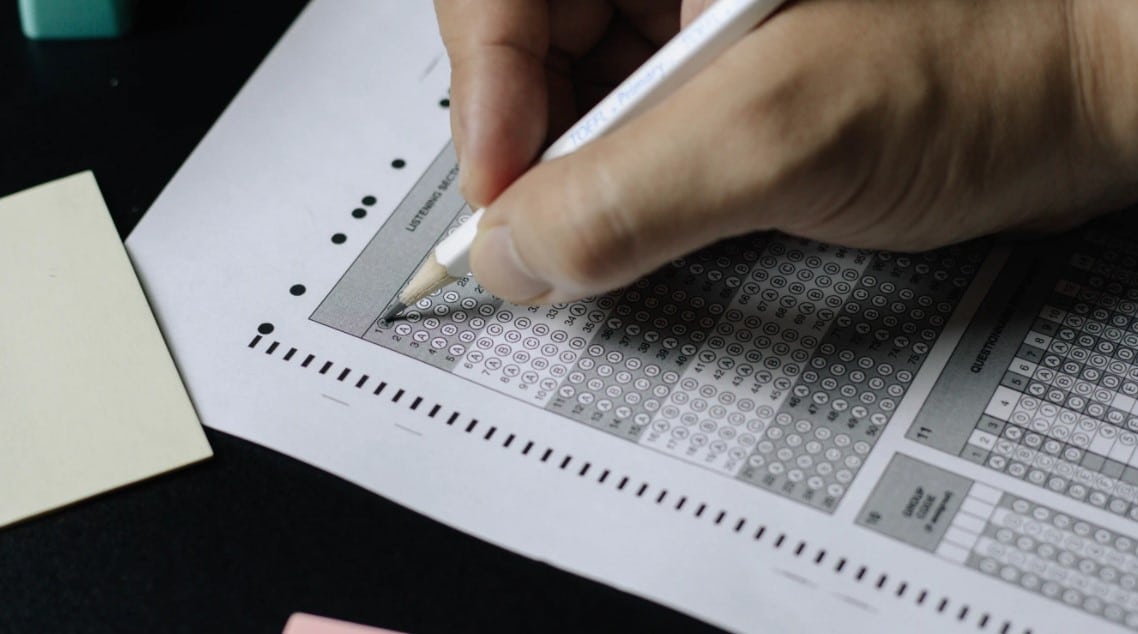SAT Superscore | Superscoring Makes a Huge Difference to Your Testing
The SAT superscore is a student’s friend. If you’ve been buried deep in test prep and research about SAT/ACT scores, college admissions, and the different score-use policies of every university (or sometimes college department), you can stop getting overwhelmed now. Take advantage of SAT superscoring to highlight the best of your abilities.
This guide should help you understand how to superscore the SAT and discover which schools allow superscoring (and those that do not). Of course, to begin with, you should get familiar with the best SAT prep courses here and the best SAT prep books in this review, to boot. In addition, check out what the SAT scores in different states are.
Understanding SAT Scores
Anyone who takes the SAT receives a composite score for that particular test date.
Composite score refers to the total test of a student s highest scores you get from each section. For the SAT, the two main sections are ERBW (evidence-Based Reading and Writing) section and the Math section. Section scores range from 200 to 800 points each, with 1600 points as the highest composite score possible. When it comes to the lowest score threshold on your SAT, read this useful article.
College Board, the organization that administers the SATs, places no restrictions on how often students can take the SAT. This means you can take the SAT two times, three times, or as many times you want. However, you can only save your most recent 6 SAT on your official file.
What Is an SAT Superscore?
If you took the SAT two or three times, chart your scores and highlight the highest section scores from all test records. Decide the best score for ERBW and Math, then add these two scores to get your superscore.
Simply put, the SAT Superscore is the total of student s highest section scores, even from two (or more) different SAT score reports.
To understand this more simply, here’s an example:
- Mary took the SAT for the first time in the spring of her junior year. She scored 620 on the Evidence-Based Reading and Writing test, and then 570 in Math for a total score of 1190.
- Many colleges allow students to pick the highest section scores from their SATs. They could either ask you to list the score and test date of your best section scores or just submit all of your test dates (and the colleges superscore the SAT for you). Sometimes, a school could let you pick from 2 out of 3 test dates, leaving out the third with the lowest test scores.

Now here’s where superscoring makes a HUGE difference to the education of students.
- So based on this example, if Mary used the Evidence-Based Reading and Writing section score from her first SAT (that’s 620) and picked her highest Math score (that’s 710 from her second SAT), Mary’s Superscore would be 1330. This is 140 points higher than her first SAT total score and 70 points higher than her second SAT.
Many colleges that superscore the SATs of students do this because it increases their SAT ranking in the process. As a student submitting this as part of application requirements, superscoring shouldn't bother you because it is actually beneficial to you as well. You are allowed to use the best scores from each section, even if they happened on different test dates.
Is Score Choice the same as Superscoring?
No, Score Choice is different from Superscores.
The College Board provides Score Choice™, a feature that lets students pick which SAT scores or sets of SAT scores they want to send to a college. If you decide to use Score Choice, you can only choose by test date, which means you can't cherry-pick section scores with the highest Critical Reading or Math scores.
Score Choice means you are stuck with a composite score from a single test. However, Score Choice does give the student more control.
After you consider the highest SAT scores, the College Board will prepare the score reports free of charge and send them along with your college applications to each of your preferred colleges.
Do note that Score Choice is not an option for other schools. Some colleges, universities, and scholarship programs require you to send all your test scores.

Do Ivy Leagues Superscore the SAT?
If you're eyeing competitive Ivy Leagues and wondering if your dream school is included in the list of colleges that superscore SAT scores, here's a summary of what these colleges say about SAT superscoring:
- Harvard University (Massachusetts) - Harvard is one of the most competitive schools in North America. Harvard says "You are free to use the College Board's Score Choice option or the similar option offered by ACT when applying to Harvard."
- Yale University (Connecticut) - Yale University states: "When assessing SAT results, admissions officers will focus on the highest individual section scores from all test dates. For example, if an applicant took the SAT twice, the highest Evidence-Based Reading and Writing and Math scores will be considered individually. "
- Princeton University (New Jersey) - According to Princeton University, "We allow applicants to use the score choice feature of the SAT and accept only the highest composite score of the ACT, but we encourage the submission of all test scores."
- Columbia University (New York) - Columbia University says, "If you take an exam more than once, you will be evaluated on the highest SAT score you received in any individual section."
- Brown University (Rhode Island) - Brown University accepts a student's SAT Score Choice and also superscore the records if students submit all scores.
- Dartmouth College (New Hampshire) - Dartmouth College states "If you submit scores from both the SAT and ACT, we will look at your highest equivalent score. For the SAT score, we take the highest section scores, regardless of the test dates."
- University of Pennsylvania (Pennsylvania) - Penn "permits Score Choice, but encourages students to submit their entire testing history for both ACT and SAT exams."
- Cornell University (New York) - Cornell University accepts the College Board Score Choice program. For the SAT, Cornell considers the highest scores-per-section across test dates.
How to Manually Search SAT Score Policies of Schools
If you're looking for SAT scores and admission information from other non-Ivy League universities, the College Board has a VERY useful feature to find which colleges superscore the SAT.
- Visit Bigfuture's Find Colleges Search Feature.
- Enter the institute you're interested in. (Use Boston College as an example). Select from the drop-down list and click Go.
- Since you searched for Boston College, you'll be directed to the school page. On the left panel, click on "Applying."
- Check the "Application Requirements" tab. From this tab, scroll down the "Test Policies" header and look at the "SAT Score use policy."
Searching through this database takes no time at all. Students planning their higher education and figuring out what their dream schools require SAT-wise should take advantage of this tool.
Which Colleges Do Not Superscore SAT?
Many students check out the College Board's BIG list of colleges and their SAT score/superscoring policies. However, superscoring isn't a practice in some schools.
Here are examples of such schools that DO NOT superscore SAT scores:
Alaska Bible College |
Allegheny Wesleyan College (OH) |
Arizona State University |
Augsburg College (MN) |
Augustana College (SD) |
Baker University (KS) |
Baptist Bible College (PA) |
Belmont University (TN) |
Bethany Lutheran College (MN) |
Boise State University (ID) |
Calvin College (MI) |
Carroll College (MT) |
Central Wyoming College |
Clarendon College (TX) |
Clearwater Christian College (FL) |
Coe College (IA) |
College of Mount Saint Joseph (OH) |
College of Saint Scholastica (MN) |
Colorado State University |
Cottey College (MO) |
Crossroads College (MN) |
Crown College (TN) |
Delta State University (MS) |
Dunwoody College of Technology (MN) |
Eastern Illinois University |
Eastern Oregon University |
Faulkner University (AL) |
Heritage Baptist University (IN) |
Heritage Christian University (AL) |
Hesston College (KS) |
Hillsdale College (MI) |
Hodges University (FL) |
Huntington University (IN) |
Illinois College |
Kent State University (OH) |
Keuka College (NY) |
Lake Superior State University (MI) |
Lakeland College (WI) |
Lexington College (IL) |
Lincoln College (IL) |
Louisiana State University Baton Rouge |
Louisiana Tech University |
Lyon College (AR) |
Marian University (WI) |
Marquette University (WI) |
Maryville University (MO) |
Mayo School of Health Sciences (MN) |
Middle Tennessee State University |
Missouri Baptist University |
Missouri State University |
National University (CA) |
North Central State College (OH) |
North Dakota State University |
Northern Illinois University |
Northern Michigan University |
Ohio Dominican University |
(The) Ohio State University |
Oral Roberts University (OK) |
Oregon State University |
Pacific Union College (CA) |
Park University (MO) |
Pillar College (NJ) |
Pittsburg State University (KS) |
Potomac State College of West Virginia University |
Presentation College (SD) |
Ripon College (WI) |
Rocky Mountain College (MT) |
Rosemont College (PA) |
Saginaw Valley State University (MI) |
Saint Louis College of Pharmacy (MO) |
Saint Mary’s University (MN) |
Sam Houston State University (TX) |
Southeastern Oklahoma State University |
Southern Illinois University |
Southern Virginia University |
Southwestern Christian University (OK) |
Sterling College (KS) |
Texas Woman’s University |
The King’s College (NY) |
University of Alabama |
University of Alabama Birmingham |
University of Arizona |
University of California university system |
University of Findlay (OH) |
University of Houston (TX) |
University of Iowa |
University of Mary Hardin-Baylor (TX) |
University of Montevallo (AR) |
University of Nebraska Lincoln |
University of Nevada Las Vegas |
University of Nevada Reno |
University of North Dakota Grand Forks |
University of Northern Iowa |
University of Sioux Falls (SD) |
University of Texas Austin |
University of the Cumberlands (KY) |
University of the Ozarks (AR) |
University of the Southwest (NM) |
University of Toledo (OH) |
University of Utah |
University of Wisconsin Green Bay |
University of Wisconsin Madison |
University of Wisconsin Oshkosh |
University of Wisconsin Stevens Point |
University of Wisconsin Whitewater |
University of Wyoming |
Valparaiso University (IN) |
Waldorf College (IA) |
Warner Pacific College (OR) |
West Virginia University |
Western Washington University |
Westwood College: Dupage (IL) |
William Penn University (IA) |
Xavier University (LA) |
While this superscoring data is useful, we recommend every student to verify the information with their target institute, since these data could change with the new admissions cycle.
The good news is schools list their specific SAT score use policy, usually as part of the college application requirements from their respective Admissions departments.
Should I Superscore my SAT?
To make sure you get the best SAT score, take the SAT prepared. Many students study for the SAT exam as early as sophomore year, then take it for the first time in junior high school.
Taking the SAT early, like in your freshman or sophomore year, isn't recommended because some of the subjects included in the SAT will be introduced only in your junior year.
Depending on how much prep you made for the exam, you can decide if your scores are enough to get you accepted into your dream college. Or not.
Superscoring & Taking the SAT Multiple Times
And because the SAT can be taken as many times as you want, we recommend you take the test a second time. Just make sure you use what you learned from the first SAT and do better the second time around.
If your dream school allows students to submit all scores, use this opportunity, and let the school superscore your SAT records.


